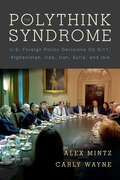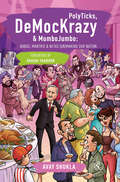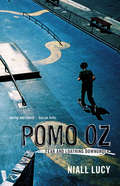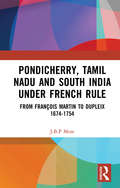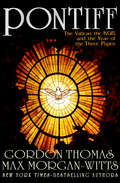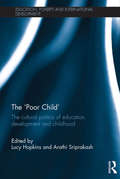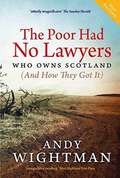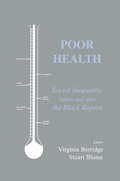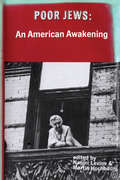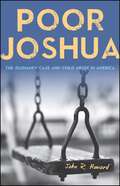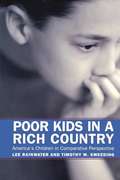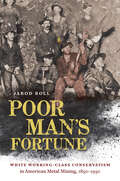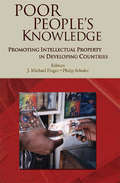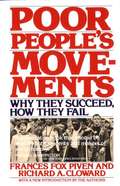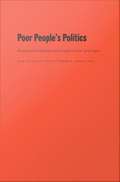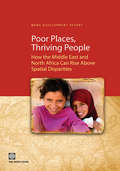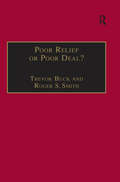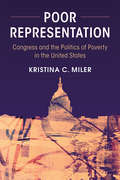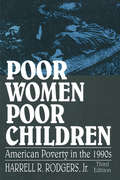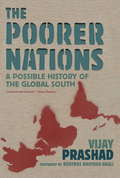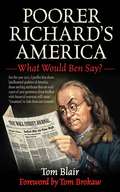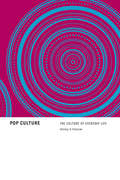- Table View
- List View
The Polythink Syndrome: U.S. Foreign Policy Decisions on 9/11, Afghanistan, Iraq, Iran, Syria, and ISIS
by Carly Wayne Alex Mintz Alex MintzfWhy do presidents and their advisors often make sub-optimal decisions on military intervention, escalation, de-escalation, and termination of conflicts? The leading concept of group dynamics, groupthink, offers one explanation: policy-making groups make sub-optimal decisions due to their desire for conformity and uniformity over dissent, leading to a failure to consider other relevant possibilities. But presidential advisory groups are often fragmented and divisive. This book therefore scrutinizes polythink, a group decision-making dynamic whereby different members in a decision-making unit espouse a plurality of opinions and divergent policy prescriptions, resulting in a disjointed decision-making process or even decision paralysis. The book analyzes eleven national security decisions, including the national security policy designed prior to the terrorist attacks of 9/11, the decisions to enter into and withdraw from Afghanistan and Iraq, the 2007 "surge" decision, the crisis over the Iranian nuclear program, the UN Security Council decision on the Syrian Civil War, the faltering Kerry Peace Process in the Middle East, and the U.S. decision on military operations against ISIS. Based on the analysis of these case studies, the authors address implications of the polythink phenomenon, including prescriptions for avoiding and/or overcoming it, and develop strategies and tools for what they call Productive Polythink. The authors also show the applicability of polythink to business, industry, and everyday decisions.
PolyTicks, DeMocKrazy & MumboJumbo: Babus, Mantris & Netas (Un)Making Our Nation
by Avay ShuklaAn uproariously funny, no-holds-barred tussle with India's entire canvas: political culture and current affairs, the environment and conservation, the bureaucracy and governance, legal matters, social issues, societal peccadilloes, and anything else that can be lampooned. The foibles are treated with indulgent banter, the failures with wit and raillery of the highest order. Avay Shukla is an original voice. A major discovery.
Pomo Oz: Fear and Loathing Downunder
by Niall LucyDemonstrating how ideas are in short supply and critical thinking is under attack in the present day, this unique study pits the author’s brand of humor and intellect against conservative power brokers. Arguing the notion that free thought—not free trade—is the basis of democracy, these exciting and provocative essays engage with the most contentious issues of today.
Pondicherry, Tamil Nadu and South India under French Rule: From François Martin to Dupleix 1674-1754
by J.B.P. MoreThis is a study of the colonization of Pondicherry, Tamil Nadu and South India by the French during the eighteenth century, and their interactions with the Indian rulers and populations in the political, economic, social and religious spheres. French Governors based in Pondicherry since François Martin up to Dupleix never acquired any territory for France through outright conquest. They or their masters in France never had any grand plan to establish a French empire in India. Some Indian rulers were friendly with the French and the English as it served their interests. The study demonstrates that the French colonizers and missionaries would not have survived in India without the collaboration of the Indian dubashes, merchants, certain Indian rulers and military men.This collaboration was not on an equal footing, as the sepoys, merchants and dubashes were always subordinate and submissive to the Europeans. Even Ananda Ranga Poullé, the most famous of the Indian dubashes had to resort to the art of flattery to be in the good books of his ‘master’. European arrival and presence in India heralded the beginning of a cultural clash between the Europeans and Indians, in which the former had the upper hand. There was never any partnership or ‘master-bania’ relationship between the French and the Indians. Instead, the relationship had all the trappings of a ‘master-subordinate’ relationship, where the subordinate even though he might be a dubash was always at the mercy of the colonizers. The element of force, aggressivity and violence was omnipresent in European presence and expansion in India, in the political, economic and religious fields.Please note: This title is co-published with X. Taylor & Francis does not sell or distribute the Hardback in India, Pakistan, Nepal, Bhutan, Bangladesh and Sri Lanka.
Pontiff: The Vatican, the KGB, and the Year of the Three Popes
by Gordon Thomas Max Morgan-WittsThe story of Paul VI, John Paul I, and John Paul II—and an assassination plot—by the New York Times–bestselling coauthors of The Day the World Ended. The Vatican has remained one of the last unexamined mysteries of the modern world. For centuries, pomp and pageantry have hidden from view the dramatic, sometimes sinister, realities that haunt the office of Supreme Pontiff and the men who make up his papacy. Gordon Thomas and Max Morgan Witts now bring their tremendous investigative talent to this most secret of institutions, offering us an unrivaled portrait and day-to-day account of the lives, personalities, and relationships of the three most recent popes: an equally fine account of the hour-by-hour deliberations of the closely guarded conclaves at which two popes were elected in the fateful year of 1978; and a remarkable rendering of the concrete issues facing the institutional papacy—in foreign affairs, economic matters, and the human factor—the highly individual ambitions, loyalties, and hatreds that characterize the men and women who serve the Holy Father. The result is a book that is ahead of the world&’s headlines, a book that makes headlines of its own. Not only have the authors brought the world of the Vatican into the open, their sleuthing has uncovered several major news stories. Pontiff includes a day-to-day account of the assassination attempt by Mehmet Ali Agca upon John Paul II: Agca&’s history and family, his right-wing political connections, his activities and jailing in Turkey, his escape from jail aided by the KGB, his movements through terrorist training camps in Libya and Syria, and a complete investigation of the Bulgarian connection that led to the shooting in St. Peter&’s Square. Here, also, is the story of John Paul II&’s involvement with the creation of Solidarity in Poland, and his almost-daily secret contacts with Lech Walesa, as well as the unprecedented letter to Brezhev threatening his resignation from the papal throne. In addition, owing to the authors&’ intricate web of connections at the Vatican (including many cardinals), the book contains previously unknown information about the man entrusted with the Church&’s money, Paul Marcinkus, and his relationship with the shadowy Michele Sindona. Pontiff is a fascinating revelation of a world previously unknown to us, and an intimate view of a few men in Rome trying to lead an increasingly unwilling world to their own vision of salvation.
The 'Poor Child': The cultural politics of education, development and childhood (Education, Poverty and International Development)
by Arathi Sriprakash Lucy HopkinsWhy are development discourses of the ‘poor child’ in need of radical revision? What are the theoretical and methodological challenges and possibilities for ethical understandings of childhoods and poverty? The ‘poor child’ at the centre of development activity is often measured against and reformed towards an idealised and globalised child subject. This book examines why such normative discourses of childhood are in need of radical revision and explores how development research and practice can work to ‘unsettle’ the global child. It engages the cultural politics of childhood – a politics of equality, identity and representation – as a methodological and theoretical orientation to rethink the relationships between education, development, and poverty in children’s lives. This book brings multiple disciplinary perspectives, including cultural studies, sociology, and film studies, into conversation with development studies and development education in order to provide new ways of approaching and conceptualising the ‘poor child’. The researchers draw on a range of methodological frames – such as poststructuralist discourse analysis, arts based research, ethnographic studies and textual analysis – to unpack the hidden assumptions about children within development discourses. Chapters in this book reveal the diverse ways in which the notion of childhood is understood and enacted in a range of national settings, including Kenya, India, Mexico and the United Kingdom. They explore the complex constitution of children’s lives through cultural, policy, and educational practices. The volume’s focus on children’s experiences and voices shows how children themselves are challenging the representation and material conditions of their lives. The ‘Poor Child’ will be of particular interest to postgraduate students and scholars working in the fields of childhood studies, international and comparative education, and development studies.
The Poor Had No Lawyers: Who Owns Scotland (and How They Got It)
by Andy WightmanIn this updated edition of his &“utterly magnificent&” social history, the Scottish parliamentarian examines the privatization of Scotland&’s common land (Sunday Herald, UK). As an author, activist, and politician, Andy Wightman has made a career of fighting for Scottish land reform. In this provocative and influential book, Wightman offers a revealing analysis of how and why landowners got their hands on the millions of acres that were once held in common. He also tells the untold story of how the Scottish legal and political establishment appropriated land through legal fixes. Throughout, Wightman poses some provocative questions: Have attempts to redistribute power made any difference? What are the implications of the debt-fueled housing bubble, the Smith Commission, and the new Scottish Government's proposals on land reform? Can we get our common good land back? For all those with an interest in urban and rural land in Scotland, this edition of The Poor Had No Lawyers, updated with new statistics, provides a fascinating analysis of one the most important political questions in Scotland.
Poor Health: Social Inequality before and after the Black Report (British Politics and Society)
by Virginia Berridge Stuart BlumeThe 1980 Black Report by Sir Douglas Black has kept health inequalities at the forefront of the public health agenda. This volume explores the history and development of studies and concern over health inequalities especially in relation to the 1980 report.
Poor Jews: An American Awakening
by Naomi Levine and Martin HochbaumThe popular image of the Jewish community is that it consists primarily of members of the middle and upper middle classes. But this image is far from true. Poor Jews: An American Awakening shatters, once and for all, the stereotype of Jewish affluence.Citing national data and descriptions of the life-styles of the Jewish poor, the authors reveal unique social characteristics of the Jewish poor—including the surprising statistic that over two-thirds of the members of this group are past the age of sixty, thus experiencing the compounded disadvantage of being poor, elderly, and deserted by the young, mobile Jewish community.Reasons for the "invisibility" of Jewish poverty are examined, as well as how the Jewish community has responded to poverty within its own ethnic group and Jewish attitudes toward the welfare state and charity. The lack of Jewish participation in antipoverty programs is cited, along with measures which will bring them fully into this and other federal and state programs.
Poor Joshua: The DeShaney Case and Child Abuse in America
by John R. HowardIn DeShaney v. Winnebago County Department of Social Services, a bitterly divided Supreme Court rejected a claim brought on behalf of five-year old Joshua DeShaney, left permanently disabled after sustained abuse, despite regular home visits by social workers charged with monitoring his welfare. In its decision the court asserted that the state has no duty to shield citizens from private violence, even those involved in their lives and knowing of their distress. Poor Joshua tracks the story from its origins in small town Wisconsin to the Supreme Court and chronicles the tragic consequences of the majority decision. John R. Howard shows how that decision became the rock on which later child abuse cases foundered, and how it echoes today in every newspaper story about society's failure to protect children. The continuing vitality of DeShaney, he argues, derives from a persistent sense that the decision is legally incorrect and profoundly at odds with the underlying values of the Constitution. The case is also about different visions of our social order and the relationship between "law" and "justice." Howard summarizes the substantial law review literature critical of the DeShaney decision and erects the scaffolding for a counterargument bringing law into a closer alignment with justice.
Poor Kids In A Rich Country: America's Children In Comparative Perspective
by Lee Rainwater Timothy M. SmeedingIn comparing the situation of American children in low-income families with their counterparts in other wealthy countries, Lee Rainwater and Timothy M. Smeeding provide a powerful perspective on the dynamics of child poverty in the United States.
Poor Man's Fortune: White Working-Class Conservatism in American Metal Mining, 1850–1950
by Jarod RollWhite working-class conservatives have played a decisive role in American history, particularly in their opposition to social justice movements, radical critiques of capitalism, and government help for the poor and sick. While this pattern is largely seen as a post-1960s development, Poor Man's Fortune tells a different story, excavating the long history of white working-class conservatism in the century from the Civil War to World War II. With a close study of metal miners in the Tri-State district of Kansas, Missouri, and Oklahoma, Jarod Roll reveals why successive generations of white, native-born men willingly and repeatedly opposed labor unions and government-led health and safety reforms, even during the New Deal. With painstaking research, Roll shows how the miners' choices reflected a deep-seated, durable belief that hard-working American white men could prosper under capitalism, and exposes the grim costs of this view for these men and their communities, for organized labor, and for political movements seeking a more just and secure society. Roll's story shows how American inequalities are in part the result of a white working-class conservative tradition driven by grassroots assertions of racial, gendered, and national privilege.
Poor Man's Fortune: White Working-Class Conservatism in American Metal Mining, 1850–1950
by Jarod RollWhite working-class conservatives have played a decisive role in American history, particularly in their opposition to social justice movements, radical critiques of capitalism, and government help for the poor and sick. While this pattern is largely seen as a post-1960s development, Poor Man's Fortune tells a different story, excavating the long history of white working-class conservatism in the century from the Civil War to World War II. With a close study of metal miners in the Tri-State district of Kansas, Missouri, and Oklahoma, Jarod Roll reveals why successive generations of white, native-born men willingly and repeatedly opposed labor unions and government-led health and safety reforms, even during the New Deal. With painstaking research, Roll shows how the miners' choices reflected a deep-seated, durable belief that hard-working American white men could prosper under capitalism, and exposes the grim costs of this view for these men and their communities, for organized labor, and for political movements seeking a more just and secure society. Roll's story shows how American inequalities are in part the result of a white working-class conservative tradition driven by grassroots assertions of racial, gendered, and national privilege.
Poor People's Knowledge: Promoting Intellectual Property in Developing Countries
by Philip Schuler J. Michael FingerHow can we help poor people earn more from their knowledge-rather than from their sweat and muscle alone? This book is about increasing the earnings of poor people in poor countries from their innovation, knowledge, and creative skills. Case studies look at the African music industry; traditional crafts and ways to prevent counterfeit crafts designs; the activities of fair trade organizations; biopiracy and the commercialization of ethnobotanical knowledge; the use of intellectual property laws and other tools to protect traditional knowledge. The contributors' motivation is sometimes to maintain the art and culture of poor people, but they recognize that except in a museum setting, no traditional skill can live on unless it has a viable market. Culture and commerce more often complement than conflict in the cases reviewed here. The book calls attention to the unwritten half of the World Trade Organization's Agreement on the Trade Related Aspects of Intellectual Property (TRIPS). TRIPS is about knowledge that industrial countries own, and which poor people buy. This book is about knowledge that poor people in poor countries generate and have to sell. It will be of interest to students and scholars of international trade and law, and to anyone with an interest in ways developing countries can find markets for cultural, intellectual, and traditional knowledge.
Poor People's Movements: Why They Succeed, How They Fail
by Frances F. Piven Richard A. ClowardHave the poor fared best by participating in conventional electoral politics or by engaging in mass defiance and disruption? The authors of the classic Regulating The Poor assess the successes and failures of these two strategies as they examine, in this provocative study, four protest movements of lower-class groups in 20th century America: -- The mobilization of the unemployed during the Great Depression that gave rise to the Workers' Alliance of America -- The industrial strikes that resulted in the formation of the CIO -- The Southern Civil Rights Movement -- The movement of welfare recipients led by the National Welfare Rights Organization.
Poor People's Politics: Peronist Survival Networks and the Legacy of Evita
by Javier Auyero"Political clientelism" is a term used to characterize the contemporary relationships between political elites and the poor in Latin America in which goods and services are traded for political favors. Javier Auyero critically deploys the notion in Poor People's Politics to analyze the political practices of the Peronist Party among shantytown dwellers in contemporary Argentina. Looking closely at the slum-dwellers' informal problem-solving networks, which are necessary for material survival, and the different meanings of Peronism within these networks, Auyero presents the first ethnography of urban clientelism ever carried out in Argentina. Revealing a deep familiarity with the lives of the urban poor in Villa Paraso, a stigmatized and destitute shantytown of Buenos Aires, Auyero demonstrates the ways in which local politicians present their vital favors to the poor and how the poor perceive and evaluate these favors. Having penetrated the networks, he describes how they are structured, what is traded, and the particular way in which women facilitate these transactions. Moreover, Auyero proposes that the act of granting favors or giving food in return for votes gives the politicians' acts a performative and symbolic meaning that flavors the relation between problem-solver and problem-holder, while also creating quite different versions of contemporary Peronism. Along the way, Auyero is careful to situate the emergence and consolidation of clientelism in historic, cultural, and economic contexts. Poor People's Politics reexamines the relationship between politics and the destitute in Latin America, showing how deeply embedded politics are in the lives of those who do not mobilize in the usual sense of the word but who are far from passive. It will appeal to a wide range of students and scholars of Latin American studies, sociology, anthropology, political science, history, and cultural studies.
Poor Places, Thriving People: How the Middle East and North Africa Can Rise Above Spatial Disparities
by World BankGeographical differences in living standards are a pressing concern for policymakers in the Middle East and North Africa (MENA). Economies of agglomeration mean that production is most efficient when concentrated in leading areas. So how can the region reduce spatial disparities in well-being without compromising growth? The solution to spatial disparities lies in matching the policy package to a lagging area's specific characteristics. Key questions include: is the lagging area problem really as serious as one thinks; is it a problem of low economic opportunity or of poor human development; are lagging area populations close enough to agglomerations to benefit from spillovers; and is there manifest private investor interest? Drawing on the World Bank's 2009 World Development Report, Reshaping Economic Geography, the book proposes 3 policy packages. First, all lagging areas can benefit from a "level playing-field for development" and investment in people. Geographic disparities in the policy environment are a legacy of MENA's history, and gaps in human development are a major component of spatial disparities. Smart policies for the investment environment, health, education, social transfers and urban development can therefore close spatial gaps in living standards. Second, lagging areas that are close to economic agglomeration can benefit from spillovers - provided that they are connected. MENA's expenditure priority is not necessarily long-distance primary connections, but infrastructure maintenance and short-distance connections such as rural roads and peri-urban networks. Public-private partnerships can also bring electronic connectivity to lagging areas. Third, shifting regional development policy away from spatial subsidies towards the facilitation of cluster-based growth will increase the chance of cost-effective impacts. The final chapter of the book examines the institutional prerequisites for effective spatial policy. It argues that MENA's centralized/sectoral structures are not always adapted to governments' spatial development agendas, and describes alternative institutional options.
Poor Relief or Poor Deal?: The Social Fund, Safety Nets and Social Security (Studies in Cash & Care)
by Trevor BuckThe social fund has been a controversial instrument of social policy in the UK since its introduction in 1988. This book brings together new research and debate on the role and effect of the social fund in relieving poverty, and introduces evidence from the wider European field to allow comparison to be made with other countries' experience of providing a 'safety net' for their poorest citizens. This book opens up for wider discussion the question of how to provide help for disadvantaged groups and individuals at times of financial crisis. Addressing practical questions about how such schemes work (or fail to work) effectively, the book also provides the basis for more general consideration of the overall objectives which they are expected to meet. This will contribute to new thinking about the policy goals of the social fund and other emergency payment schemes, and their role in meeting broader aspirations such as cohesion, inclusion and social justice.
Poor Representation: Congress and the Politics of Poverty in the United States
by Kristina C. MilerTens of millions of Americans live in poverty, but this book reveals that they receive very little representation in Congress. While a burgeoning literature examines the links between political and economic inequality, this book is the first to comprehensively examine the poor as a distinct constituency. Drawing on three decades of data on political speeches, party platforms, and congressional behavior, Miler first shows that, contrary to what many believe, the poor are highly visible to legislators. Yet, the poor are grossly underrepresented when it comes to legislative activity, both by Congress as a whole and by individual legislators, even those who represent high-poverty districts. To take up their issues in Congress, the poor must rely on a few surrogate champions who have little district connection to poverty but view themselves as broader advocates and often see poverty from a racial or gender-based perspective.
Poor Richard
by James DaughertyThis lively text exemplifies both the man and the artist. Benjamin Franklin lived in turbulent times and met those times head-on with passion and gusto. James Daugherty—ever the patriot himself—has captured that essential nature of Franklin in his energetic and dramatic three-color lithographs that reveal the neophyte as he faces the fresh soil of a young nation filled with optimism and promise. From his Quaker childhood to his early days as printer's apprentice to runaway, to stranger in the City of Brotherly Love, to the "Water American" in London, Ben's youth was filled with adventures and challenges that taught him invaluable lessons about human nature. These lessons would serve him well as he grew to be a leader of the young colonies as they faced the tyranny of Britain. As a leader in the American Revolution he was indispensable as an ambassador to England and later France where he won the hearts of the nation by his simple Quaker wisdom and geniality. All these things were accomplished while he pursued his interests as scientist, inventor, and prolific author. In everything he did, Franklin was always compelled by how he might best serve his fellow man.
Poor Women, Poor Children: American Poverty in the 1990s
by RodgersThis work presents the most recent data on poverty, family structure and participation in welfare programmes. It analyses the causes for the continuing rise in female-headed households, the high rates of poverty among such families, and evaluates past, present and future reform policies.
The Poorer Nations
by Vijay PrashadIn The Darker Nations, Vijay Prashad provided an intellectual history of the Third World and told the story of the rise and fall of the Non-Aligned Movement.With The Poorer Nations, Prashad takes up the story where he left it. Since the '70s, the countries of the Global South have struggled to express themselves politically. Prashad analyzes the failures of neoliberalism, as well as the rise of the BRIC countries, the Group of 12, the World Social Forum, the Latin American revolutionary revival--in short, all the efforts to create alternatives to the neoliberal project advanced militarily by the US and its allies, among whom number the IMF, the World Bank, the WTO, and other economic instruments of the powerful.A true global history, The Poorer Nations is informed by interviews with leading players such as senior UN officials, as well as Prashad's pioneering research into archives of the Julius Nyerere-led South Commission.
Poorer Richard's America: What Would Ben Say?
by Tom Brokaw Tom BlairFor decades, Benjamin Franklin's Poor Richard's Almanack provided sage advice and commentary on eighteenth-century America. Now, a modern businessman reflects-writing as Benjamin Franklin-on what America has become. Federal and personal debt are ballooning beyond sustainable levels. Our futures are being jeopardized. Partisan bickering and the entrenched powers of special interests have made it nearly impossible for a real leader to lead. Where is a good American to turn? How about to the man who wrote this timeless observation: "A small leak will sink a great ship"? Ben is back! With his signature intelligence and wit (not to mention a good sprinkling of aphorisms both old and new), Benjamin Franklin, through Tom Blair, moves from the national deficit to Wall Street, from health care to marital bliss. The result is electrifying.
Pop Culture: The Culture of Everyday Life
by Shirley FedorakWhile usually associated with facets of commercial culture, pop culture can and must be analyzed as an important part of material, economic, and political culture. The author begins by defining popular culture, outlining criticisms, and examining the impact of globalization on pop culture. She then explores mass media and popular culture (soap operas, Egyptian melodramas, Afro-Cuban rap music, and virtual communities), artistic expression and popular culture (graffiti art and body art), and gatherings and popular culture (fast food in Japan, equality in sport, and wedding rituals).
Pop Princess: Book 4
by Rosie BanksA gorgeous new series about best friends and magical princesses!Best friends Charlotte and Mia are training to be Secret Princesses, magical princesses who grant wishes! But mean Princess Poison has a plan to stop them. If they don't grant the last wish, Wishing Star Palace will be destroyed forever!The girls have to help Samira's wish come true, even if it means stepping into the spotlight themselves! Can the girls grant Sam's wish and save Wishing Star Palace before it's too late?Plus...* Special campaign with Monsoon Children's - win the same princess outfits as Charlotte and Mia for you and your best friend!* Collect the tokens for a exclusive Best Friends necklace designed by Monsoon!
